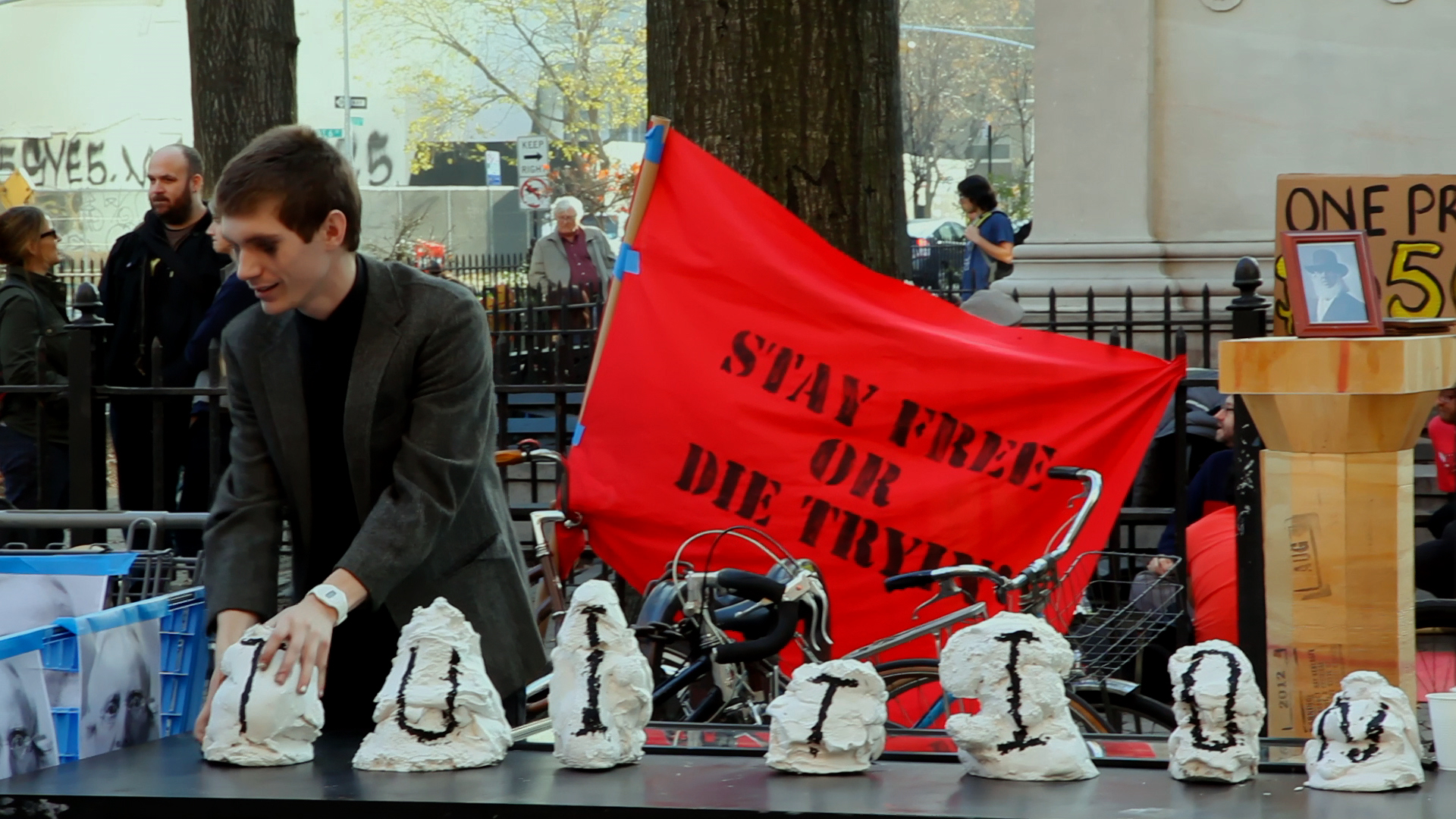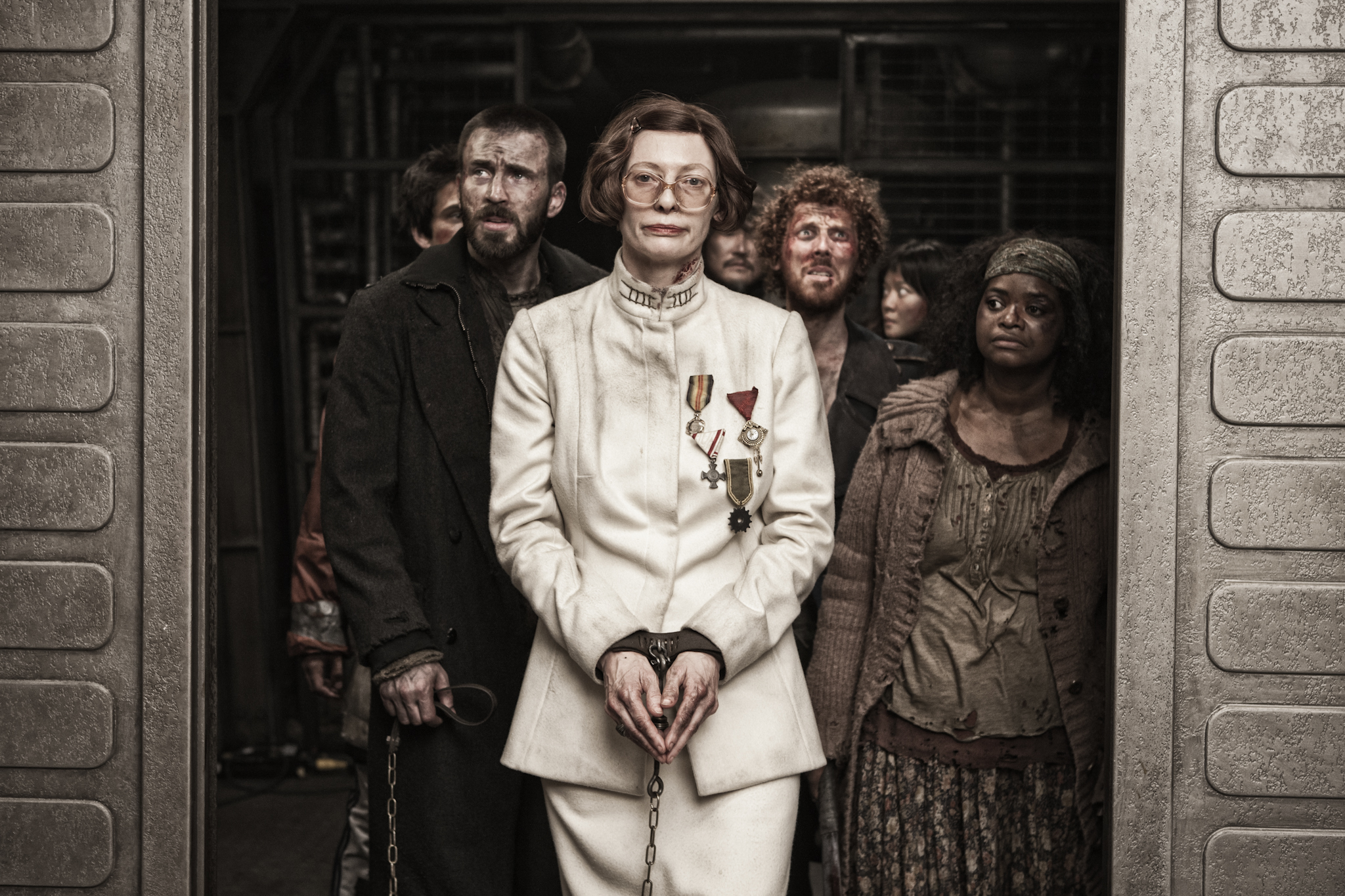Opening ThisWeek
Ai Weiwei: The Fake Case
Runs Fri., June 27–Thurs., July 3 at Northwest Film Forum. Not rated. 86 minutes.
To make a good documentary, you need to have a good subject. But more important, you have to be lucky. When Alison Klayman filmed her Ai Weiwei: Never Sorry, seen here in 2012, it was still fairly shocking that the Chinese activist and artist would be kidnapped and detained by his government for 81 days. She got to cover the period of his peak outspokenness (at home) and acclaim (abroad). Then came the cataclysm of his arrest—not something she wished, but a dramatic ending to her film.
Now Andreas Johnsen picks up the story, following Ai’s June 2011 release, and luck is not on his side. Limbo is where Ai presently resides, and it is not an interesting place. He emerges from incarceration discreet and abashed, if not quite muzzled. Under house arrest, he can’t travel. He can’t speak freely with the press. His art can only be seen abroad. He’s got his toddler son and business (called Fake Design) to protect, with employees on his payroll. By Chinese standards, he’s rich and famous—even if his name is scrupulously censored on Baidu, the state-controlled Internet search engine. And he is, now age 56, more cautious. If the government has accused Ai and Fake of tax evasion, his defense requires lawyers, money, and the tongue-biting that make it near-impossible to create art.
Yet create Ai does. We see the genus of his S.A.C.R.E.D., six boxed, half-scale dioramas of his prison experiences, currently on view in New York. (The Times’ Roberta Smith calls it “perhaps the best work of art Mr. Ai has yet made.”) He films everything, constantly monitors his own press, lives a kind of 24/7 performance-art existence, since the government is monitoring his every movement and Tweet. “I have no secrets,” he sighs—how unlike Picasso or Warhol before him. In a real sense, as with Klayman’s film, he’s orchestrating Johnsen’s documentary efforts, revealing what he wants, controlling the terms of access. In a recent interview, Johnsen said that Ai initially rejected him, saying, “Everybody wants to make a film with me—Hollywood, Europe, everybody. I have no time.” But in the end Ai, so media-savvy and active on Twitter, consented to eight visits over four years from the Danish director.
If this documentary, mainly a portrait of endurance, isn’t so scintillating, you can bet another enterprising Western filmmaker is already working with Ai on the next chapter of his remarkable life. Brian Miller
Citizen Koch
Runs Fri., June 27–Thurs., July 3 at Sundance Cinemas. Not rated. 90 minutes.
I want to hate the Koch brothers. You want to hate the Koch brothers. Yet this clumsy advocacy doc makes it hard to do. Perhaps you recall reading how directors Carl Deal and Tia Lessin lost their public-TV funding for the project, then resorted to Kickstarter, because David Koch is on the board of two PBS affiliate stations. Editorial oversight may also have been lost, and one wonders how much Deal and Lessin have tailored Citizen Koch to suit their citizen financiers, in the manner of Robert Greenwald (Outfoxed, etc.). In its tone and construction, Citizen Koch is well below PBS broadcast standards. I’ve seen better screeds stapled on telephone poles.
Most damningly, it’s old news. Much of the film is set in Wisconsin, where Gov. Scott Walker seeks to break public-sector unions, then fights against a voter recall effort. He prevailed in both battles (aided by corporate money), as we know, because they took place over two years ago and were extensively covered by NPR, The New York Times, and company. Given the amount of excellent reporting done by those annals (and The New Yorker’s Jane Meyer, in particular, on the Kochs and Citizens United ), Citizen Koch’s roster of talking heads is hugely disappointing: a few bloggers and activists, junior-varsity pundits, and the doomed 2012 Republican presidential candidate Buddy Roemer—the Dennis Kucinich of the right—whom they treat like an oracle. Money corrupts politics, he says. No, really?
Their dependence on old news clips and the occasional press conference—Tim Phillips of the Koch-funded Americans for Prosperity is particularly odious—probably reflects the filmmakers’ budget constraints. Smarter, better-sourced documentaries from the likes of Alex Gibney or Charles Ferguson take time and money. It’s cheaper to harvest our easy scorn—for Sarah Palin, the John Birch Society, Samuel Alito, etc.—and set it to that ominous synthesizer drone we know from TV campaign ads. The subject here may not demand balance, but it requires deeper insight.
As with their 2008 doc Trouble the Water, about Hurricane Katrina, Deal and Lessin do better with individual stories than the big picture. “I don’t get where regular people have become the bad guy,” says a Wisconsin prison guard about the barrage of TV ads implying his union (and others) have bankrupted the state. Well, we know where the money came from for those ads. (Gov. Walker is presently being charged by state prosecutors on that subject.) What’s more disturbing, when the filmmakers ask a Wisconsin Tea Party supporter why he believes unions are outspending corporations in that state (the opposite was true, at a ratio of roughly 8:1), is his blithe denial of the facts. He, too, is regular people. And he’s proudly voting against his economic self-interest in the name of “freedom,” just as the Kochs intended. (Note: Deal will conduct a Q&A following the 7 p.m. Sat. screening.) Brian Miller
A Coffee in Berlin
Opens Fri., June 27 at VArsity. Not rated. 88 minutes.
You wouldn’t think it’d be hard to find a single cup of coffee in all of Berlin, but this is the kind of day Niko (Tom Schilling) is having. Nothing else is going too well either, but Niko’s foiled attempts to get some java give this film the repetitive structure of a classic frustration dream. This running gag provides a nicely amusing through-line for this low-budget slacker picture, which scored big last year at the German box-office and won a batch of national film awards.
Niko’s recently split from a girlfriend and quit law school a couple of years ago (a decision that has not prevented him from accepting his father’s monthly stipend for expenses). On this particular bad day, Niko’s drifting includes a dressing-down when his dad finds out about the fraud; a few hours on the set of a melodramatic World War II film (his pal is an actor); and a strange encounter with an old schoolmate (Friederike Kempter) who’s now a performance artist. The latter provides the most comic payoff, as the formerly overweight woman cannot stop talking about her unhappy childhood or what a crush she had on Niko.
Writer/director Jan Ole Gerster reaches for significance at various moments between these skillfully executed comic sequences, and here Coffee tends to fall short. Maybe these reaches convey something culturally significant to Berliners; certainly the business about the bad WWII movie—about a Nazi officer who falls in love with a Jewish woman—suggests the exhaustion surrounding the subject, and how any catastrophe eventually gets turned into kitsch. The bland central role is also an issue; although Schilling is photogenic and well cast, there’s not much to the character beyond blankness. Niko’s reaction shots—invariably of the “How do I get out of this?” variety—constitute funny stuff, but the character’s still more of a construct than a full-blooded individual. Black-and-white cityscapes and a jazzy score indicate Gerster’s debt to Woody Allen (Allen’s reputation remains much higher in Europe than here), but even this devotion suggests the movie’s limitations. A Coffee in Berlin is a pleasant way to spend 84 minutes, but it seems like the watered-down version of something stronger. Robert Horton
Evergreen: The Road to Legalization
Runs Fri., June 27–Thurs., July 3 at SIFF Film Center. Not rated. 86 minutes.
When this doc played the film festival last year, the success of Initiative 502 was still fresh in our minds. Now, two years after our state voted to legalize pot, despite some dire warnings, the sky hasn’t fallen—stoners aren’t rolling in the gutters; the feds aren’t raiding private homes. This very partisan film by Riley Morton and Nils Cowan emphatically celebrates the activists and organizers who brought the measure to a vote, but Evergreen’s return engagement seems belated—like a victory lap run long after the fans have left the darkened stadium. Life has moved on to mundane matters of business licensing and tax collection. Venture capitalists, seen at the film’s end, have big plans for lawful pot sold outside those sketchy old dispensaries. Someone’s going to make a fortune becoming the Starbucks of marijuana. Evergreen hints at that conflict to come, but it mainly sticks the fake drama of a long-past election, its outcome known to all (last year as well).
On the side of the angels: philanthropist Rick Steves, city attorney Pete Holmes, and I-502 campaign director Alison Holcomb. Fronting the greedy opposition (boo! Hiss!) are Doug Hiatt and former SW cover boy Steve Sarich, both determined to protect their profitable turf. This internecine battle is anything but mellow, and Evergreen makes clear the conflict is primarily about the Benjamins, not the hemp.
Still, even if the film is way behind the current news cycle, it’s an enduring tribute to populist politics—not just in predictably block-voting Seattle, but in our shamefully red-leaning cousin counties. As we look at the 2014 midterm elections, when Republicans will almost certainly make Obama a powerless lame duck, here’s a rare case where urban and rural interests converge. Three generations ago, Prohibition was rejected as a national joke. Evergreen has the same bubbly spirit of democracy in action. (Note: The filmmakers and select subjects will appear at the Friday and Saturday screenings.) Brian Miller
PIvory Tower
Opens Fri., June 27 at Seven Gables. Rated PG-13. 90 minutes.
This documentary questions assumptions long accepted as gospel: that higher education is the key to success; that it’s worth any price; and that it’s all about ennobling students rather than racking up money and prestige. Such questioning is appropriate. As Ivory Tower points out, there’s a crisis at hand with skyrocketing tuition costs and student debt. Some graduates owe more than $100,000 after college.
“We need to really rethink what are the specific things that people are learning and why are they valuable,” says Peter Thiel, the high-tech entrepreneur and flame-thrower against the education establishment.
He’s not the only plainspoken source in Ivory Tower, which avoids jargon and engages its subject in fresh, vivid ways. Director Andrew Rossi is making a specialty of capturing industries in churn, as with his excellent 2011 documentary Page One: Inside the New York Times. Here he finds drama everywhere he goes—and he goes a lot of places.
At Harvard, he introduces us to a once-homeless African-American student determined to move beyond his insular Cleveland community. In the rugged dessert of California, Rossi finds the tiny, free, all-male Deep Springs College, whose educational philosophy is rooted in farm work as well as classroom debate. The polar opposite, Arizona State University, known for its hard-partying students, gives Rossi an opportunity to question whether big state schools are simply trying to profit from out-of-towners who pay premium tuition. We even get a prolonged sit-in—remember those?—at New York City’s privately endowed Cooper Union, which charged no fees for over 150 years. The recent decision to start charging tuition provoked shock and horror among its students.
Outrageously high salaries for university presidents, slashed state funding, online learning companies, and an “unschooling” movement that encourages students to drop out of college and learn skills in the real world—Rossi covers all these, too. What he does not do, however, is provide answers to the questions he raises. One minute we’re thinking that the university model is irretrievably broken, the next that it just needs to stay true to its ideals. But at least we’re thinking critically, and that seems right for a movie about higher education. Nina Shapiro
Le Chef
Opens Fri., June 27 at Harvard Exit. Rated PG-13. 84 minutes.
In this French culinary comedy, the jokes are often corny and the plot twists as predictable as our hero’s classic menu. Chef Alexandre Lagarde (Jean Reno) is on the brink of losing his third precious Michelin star because he won’t bend to the trend of molecular gastronomy. (The new owners of his bistro demand it.) Meanwhile, Jacky Bonnot (Michael Youn) is a goofy aspiring chef and longtime Lagarde devotee who can’t seem to catch a break—until of course the hallowed chef “discovers” him.
Together Jacky and Alexandre hatch a plan to save Cargo Lagarde. That familiar narrative—protege turns hero—has become a cliche in food films, but the subplots here make it slightly less derivative, as both men tend to their own botched personal relationships. Despite the flaws of Le Chef, directed by Daniel Cohen, foodies will still love its references to famous French dishes and poking fun at molecular cuisine—even though, like that style of cooking, Le Chef also borders on the absurd. Nicole Sprinkle
The Sacrament
Runs Fri., June 27–Thurs., July 3 at Grand Illusion. Not rated. 95 minutes.
The cult massacre-by-suicide popularly known as Jonestown took place on November 18, 1978, long before the embrace of the Internet. Over 900 died by poison and gunfire in that Guyana religious commune. Vice Media came into being—first as a Canadian magazine, now a property-for-sale valued at $1 to 2 billion—in 1994. So it’s a little curious that this slow-build fright flick by Ti West (The House of the Devil ) should now begin with the premise of a Vice film crew investigating a cult, fled from America to some unnamed tropical country, without ever mentioning Jonestown. Producer Sam (A.J. Bowen, with a beard like Vice founder Shane Smith) and cameraman Jake (Joe Swanberg) are savvy creatures of the new mediasphere. When photographer and colleague Patrick (Kentucker Audley) says his drug-addict sister has joined said cult and has invited him to visit, Jonestown ought to be the first word in their minds. But no.
Unlike The Blair Witch Project, this skeptics-out-of-water thriller doesn’t present itself as a (fake) found-footage exercise. The ersatz interviews, intertitles, and filmmaker comments are representative of a finished product. Someone has survived, or at least their memory cards and flash drives, from the slaughter we all know is coming. Yet West and producer Eli Roth (Hostel, Cabin Fever, etc.) stick to their weirdly ahistorical approach—even when the avuncular cult leader known as “Father” (Gene Jones) strides out to greet the film crew in his safari shirt and dark glasses. He’s a dead ringer for the Rev. Jim Jones (and for Powers Boothe, who played him in the 1980 TV movie). This is like making a movie set in ’30s Germany and pretending we don’t recognize the guy with the funny moustache.
So if West and Roth want to pretend viewers born after 1978 have no awareness of history before 1978 (despite the Internet or even their parents’ stacks of Time issues in the attic), what are we left with? Basically a suspenseless countdown to the fateful Kool-Aid. Sam and company conduct a few unsettling interviews. Patrick’s sister Caroline (Amy Seimetz of Upstream Color and The Off Hours) exhibits some bizarre, paranoid behavior. Then finally a little mute girl—of course she’s mute—hands a plaintive note to the Vice crew: “Please help us.” They’ve got a helicopter waiting the morning after their one-day visit, and everyone wants to be on it. (It’s a Huey UH-1, just like the last choppers leaving during the 1975 fall of Saigon.)
West’s House of the Devil was a scarier and more effective ’80s recreation of a movie-that-never-was (grim cousin to the recent comedy Ping Pong Summer); it felt authentic to the repressed codes and shocks of the Reagan era. That film was a manufactured artifact, a fake that respected its setting. Yet by treading on but ignoring the factual domain, The Sacrament is an entirely bogus, insulting enterprise. Those Christians who perished at Jonestown believed in something, however misguided. West takes no position on that, or on the past, other than the Vice calculation that atrocity equals clicks and eyeballs. Maybe for his next film he can reenact Dennis Rodman’s visit to Kim Jong-un’s North Korea, and pretend we don’t remember the names. Brian Miller
PSnowpiercer
Opens Fri., June 27 at SIFF Cinema Uptown. Rated R. 124 minutes.
Alfred Hitchcock called them the “plausibilists”—those nitpickers who can’t suspend disbelief long enough to swallow a movie’s colorful premise and just enjoy the thing. If you are a member of this army, you might have a problem with Snowpiercer. This futuristic picture has a whopper of a concept.
Let me state that I have no factual basis for believing that a train would be able to stay in continuous motion across a globe-girdling circuit of track for almost two decades, nor that the people on board could sustain themselves and their brutal caste system under such circumstances. But for 124 minutes of loco-motion, I had no problem buying it all. That’s because director Bong Joon-ho, making his first English-language film, has gone whole hog in imagining this self-contained universe. The train is going around the track because the world has been plunged into subzero temperatures, killing everything outside; the survivors are separated into different cars, with the have-nots in squalid conditions at the back of the train and the elites partying up front. The poor folk finally rebel—Captain America’s Chris Evans and Jamie Bell play their leaders—and stalk their way toward the godlike inventor of the supertrain, ensconced all the way up in the front. This heroic progress reveals food sources, a dance party, and some hilarious propaganda videos screened in a classroom. Each train car is a wacky surprise, fully designed and wittily detailed. The progression is a little like passing through the color-coded rooms of The Masque of the Red Death, but peopled by refugees from Orwell.
Those characters include a drug-addled security expert (Song Kang-ho, star of Bong’s spirited monster movie The Host), a grizzled veteran of the caboose (John Hurt), and the elite’s uptight spokesperson, played by Tilda Swinton as part Margaret Thatcher, part Tokyo Rose. (The train might not jump the tracks, but Swinton does, gloriously.) From each bar of gelatinous peasant-food—eccch—to the intricate workings of the train’s machinery, every inch of this film is delivered with such unapologetic verve that you probably won’t worry over bizarre shifts in tone or continuity issues. And the political allegory would be ham-handed indeed if it were being served up in a more serious context, but the film’s zany pulp approach means Bong can get away with the baldness of the metaphor. Who needs plausibility anyway? Robert Horton
E
film@seattleweekly.com








